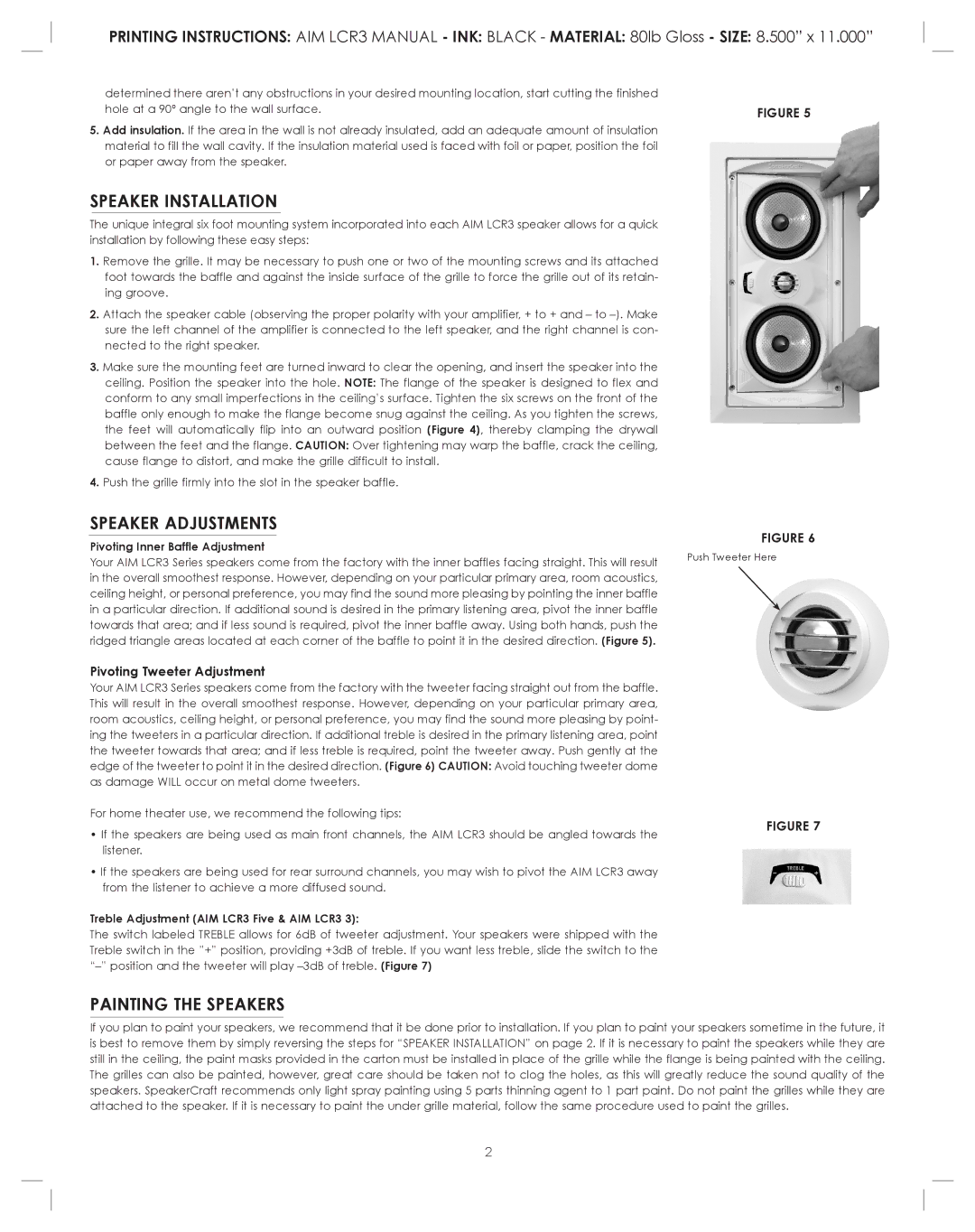
PRINTING INSTRUCTIONS: AIM LCR3 MANUAL - INK: BLACK - MATERIAL: 80lb Gloss - SIZE: 8.500” x 11.000”
determined there aren’t any obstructions in your desired mounting location, start cutting the finished |
|
hole at a 90º angle to the wall surface. | FIGURE 5 |
5.Add insulation. If the area in the wall is not already insulated, add an adequate amount of insulation material to fill the wall cavity. If the insulation material used is faced with foil or paper, position the foil or paper away from the speaker.
SPEAKER INSTALLATION
The unique integral six foot mounting system incorporated into each AIM LCR3 speaker allows for a quick installation by following these easy steps:
1.Remove the grille. It may be necessary to push one or two of the mounting screws and its attached foot towards the baffle and against the inside surface of the grille to force the grille out of its retain- ing groove.
2.Attach the speaker cable (observing the proper polarity with your amplifier, + to + and – to
3.Make sure the mounting feet are turned inward to clear the opening, and insert the speaker into the ceiling. Position the speaker into the hole. NOTE: The flange of the speaker is designed to flex and conform to any small imperfections in the ceiling’s surface. Tighten the six screws on the front of the baffle only enough to make the flange become snug against the ceiling. As you tighten the screws, the feet will automatically flip into an outward position (Figure 4), thereby clamping the drywall between the feet and the flange. CAUTION: Over tightening may warp the baffle, crack the ceiling, cause flange to distort, and make the grille difficult to install.
4.Push the grille firmly into the slot in the speaker baffle.
SPEAKER ADJUSTMENTS
Pivoting Inner Baffle Adjustment
Your AIM LCR3 Series speakers come from the factory with the inner baffles facing straight. This will result in the overall smoothest response. However, depending on your particular primary area, room acoustics, ceiling height, or personal preference, you may find the sound more pleasing by pointing the inner baffle in a particular direction. If additional sound is desired in the primary listening area, pivot the inner baffle towards that area; and if less sound is required, pivot the inner baffle away. Using both hands, push the ridged triangle areas located at each corner of the baffle to point it in the desired direction. (Figure 5).
Pivoting Tweeter Adjustment
Your AIM LCR3 Series speakers come from the factory with the tweeter facing straight out from the baffle. This will result in the overall smoothest response. However, depending on your particular primary area, room acoustics, ceiling height, or personal preference, you may find the sound more pleasing by point- ing the tweeters in a particular direction. If additional treble is desired in the primary listening area, point the tweeter towards that area; and if less treble is required, point the tweeter away. Push gently at the edge of the tweeter to point it in the desired direction. (Figure 6) CAUTION: Avoid touching tweeter dome as damage WILL occur on metal dome tweeters.
For home theater use, we recommend the following tips:
•If the speakers are being used as main front channels, the AIM LCR3 should be angled towards the listener.
•If the speakers are being used for rear surround channels, you may wish to pivot the AIM LCR3 away from the listener to achieve a more diffused sound.
Treble Adjustment (AIM LCR3 Five & AIM LCR3 3):
The switch labeled TREBLE allows for 6dB of tweeter adjustment. Your speakers were shipped with the Treble switch in the ”+” position, providing +3dB of treble. If you want less treble, slide the switch to the
PAINTING THE SPEAKERS
FIGURE 6
Push Tweeter Here
FIGURE 7
If you plan to paint your speakers, we recommend that it be done prior to installation. If you plan to paint your speakers sometime in the future, it is best to remove them by simply reversing the steps for “SPEAKER INSTALLATION” on page 2. If it is necessary to paint the speakers while they are still in the ceiling, the paint masks provided in the carton must be installed in place of the grille while the flange is being painted with the ceiling. The grilles can also be painted, however, great care should be taken not to clog the holes, as this will greatly reduce the sound quality of the speakers. SpeakerCraft recommends only light spray painting using 5 parts thinning agent to 1 part paint. Do not paint the grilles while they are attached to the speaker. If it is necessary to paint the under grille material, follow the same procedure used to paint the grilles.
2
